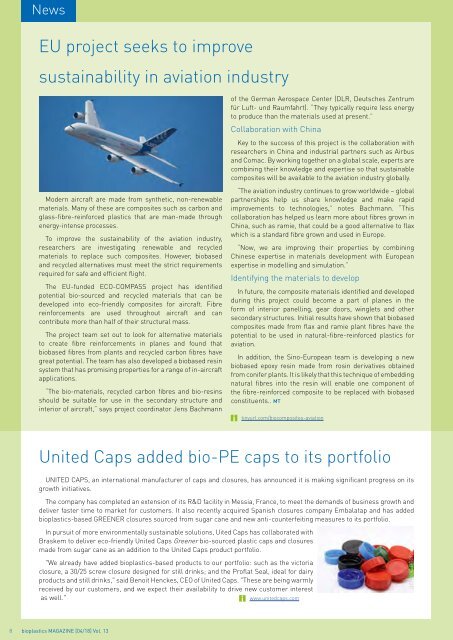Issue 04/2018
bioplasticsMAGAZINE_1804
bioplasticsMAGAZINE_1804
Create successful ePaper yourself
Turn your PDF publications into a flip-book with our unique Google optimized e-Paper software.
News<br />
EU project seeks to improve<br />
sustainability in aviation industry<br />
Modern aircraft are made from synthetic, non-renewable<br />
materials. Many of these are composites such as carbon and<br />
glass-fibre-reinforced plastics that are man-made through<br />
energy-intense processes.<br />
To improve the sustainability of the aviation industry,<br />
researchers are investigating renewable and recycled<br />
materials to replace such composites. However, biobased<br />
and recycled alternatives must meet the strict requirements<br />
required for safe and efficient flight.<br />
The EU-funded ECO-COMPASS project has identified<br />
potential bio-sourced and recycled materials that can be<br />
developed into eco-friendly composites for aircraft. Fibre<br />
reinforcements are used throughout aircraft and can<br />
contribute more than half of their structural mass.<br />
The project team set out to look for alternative materials<br />
to create fibre reinforcements in planes and found that<br />
biobased fibres from plants and recycled carbon fibres have<br />
great potential. The team has also developed a biobased resin<br />
system that has promising properties for a range of in-aircraft<br />
applications.<br />
“The bio-materials, recycled carbon fibres and bio-resins<br />
should be suitable for use in the secondary structure and<br />
interior of aircraft,” says project coordinator Jens Bachmann<br />
of the German Aerospace Center (DLR, Deutsches Zentrum<br />
für Luft- und Raumfahrt). “They typically require less energy<br />
to produce than the materials used at present.”<br />
Collaboration with China<br />
Key to the success of this project is the collaboration with<br />
researchers in China and industrial partners such as Airbus<br />
and Comac. By working together on a global scale, experts are<br />
combining their knowledge and expertise so that sustainable<br />
composites will be available to the aviation industry globally.<br />
“The aviation industry continues to grow worldwide – global<br />
partnerships help us share knowledge and make rapid<br />
improvements to technologies,” notes Bachmann. “This<br />
collaboration has helped us learn more about fibres grown in<br />
China, such as ramie, that could be a good alternative to flax<br />
which is a standard fibre grown and used in Europe.<br />
“Now, we are improving their properties by combining<br />
Chinese expertise in materials development with European<br />
expertise in modelling and simulation.”<br />
Identifying the materials to develop<br />
In future, the composite materials identified and developed<br />
during this project could become a part of planes in the<br />
form of interior panelling, gear doors, winglets and other<br />
secondary structures. Initial results have shown that biobased<br />
composites made from flax and ramie plant fibres have the<br />
potential to be used in natural-fibre-reinforced plastics for<br />
aviation.<br />
In addition, the Sino-European team is developing a new<br />
biobased epoxy resin made from rosin derivatives obtained<br />
from conifer plants. It is likely that this technique of embedding<br />
natural fibres into the resin will enable one component of<br />
the fibre-reinforced composite to be replaced with biobased<br />
constituents.. MT<br />
tinyurl.com/biocomposites-aviation<br />
United Caps added bio-PE caps to its portfolio<br />
UNITED CAPS, an international manufacturer of caps and closures, has announced it is making significant progress on its<br />
growth initiatives.<br />
The company has completed an extension of its R&D facility in Messia, France, to meet the demands of business growth and<br />
deliver faster time to market for customers. It also recently acquired Spanish closures company Embalatap and has added<br />
bioplastics-based GREENER closures sourced from sugar cane and new anti-counterfeiting measures to its portfolio.<br />
In pursuit of more environmentally sustainable solutions, Uited Caps has collaborated with<br />
Braskem to deliver eco-friendly United Caps Greener bio-sourced plastic caps and closures<br />
made from sugar cane as an addition to the United Caps product portfolio.<br />
"We already have added bioplastics-based products to our portfolio: such as the victoria<br />
closure, a 30/25 screw closure designed for still drinks; and the Proflat Seal, ideal for dairy<br />
products and still drinks," said Benoit Henckes, CEO of United Caps. "These are being warmly<br />
received by our customers, and we expect their availability to drive new customer interest<br />
as well."<br />
www.unitedcaps.com<br />
generic photo<br />
8 bioplastics MAGAZINE [<strong>04</strong>/18] Vol. 13


















